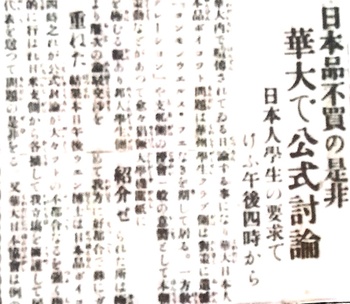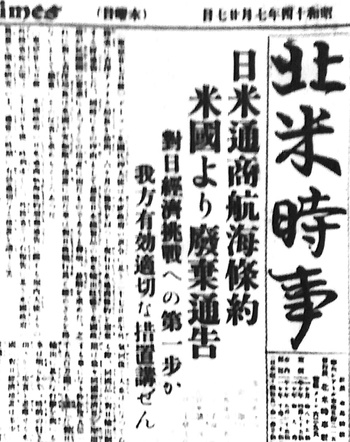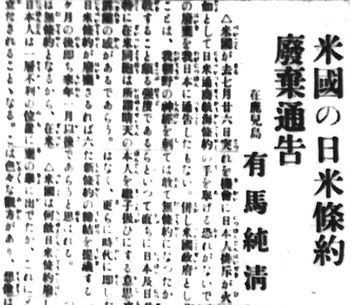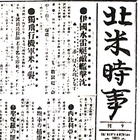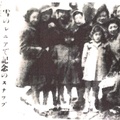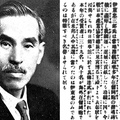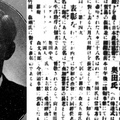In the previous chapter, I discussed the achievements of Heiji Okuda and Chuzaburo Ito. In this final chapter, I would like to share the efforts of Japanese in the US who worked toward fostering US-Japan friendship.
After the outbreak of the second Sino-Japanese War in 1937, the Japanese community in Seattle faced a very difficult environment due to the boycott of Japanese products and the notice of the abortion of the US-Japan Treaty of Commerce and Navigation from the American side. Despite these challenges, however, the Japanese community in Seattle made continuous and determined efforts to promote US-Japan friendship.
Boycott of Japanese Goods
“The Demonstration against Japan at the Vancouver Pier” (November 19, 1937 issue1)
As many as 50 men and women gathered and picketed with signs reading “Do Not Buy Japanese Goods” or “Boycott Japanese Products.” They clashed with the police, resulting in arrests and imprisonment of 22 men and 4 women.
“The Public Debate on the Pros and Cons of Not Buying Japanese Products at Washington University” (December 2, 1937 issue)
The advocacy for the boycott of Japanese products on the Washington University campus is becoming quite widespread, further complicated by the influence of the Washington Commonwealth Federation as well as the Chinese. After repeated negotiation, it was agreed that a public debate at large will be held at 4pm today, with representatives from Japan and the United States, as well as Chinese parties to argue the pro and cons of the issue. The Japanese student club of the Washington University is satisfied with this solution.
On the other hand, the opinion expressed by the faculty committee in the University’s paper this morning is quite favorable to our side, particularly Dr. Gowen, who defends our position by strongly emphasizing the inconvenience of the boycott of Japanese goods. Also the Japanese Association of the Washington University invited the Dr. Howard Martin, who is known to us, to listen to the arguments from the Chinese side, and his counterargument are greatly anticipated.
Considering that the University’s research indicates that 24% of all female students support the boycott, the advocacy for the Chinese side, centered around Dr. Gakusya who is currently visiting, will be quite aggressive. The Japanese student club has chosen Okamaru, Takagi, Kubo, Kuga, and Takahashi as committee members and is working hard to prepare the strategy.
“Representative DeLacy submits the resolution to boycott the purchase of Japanese products to the Seattle city council” (December 28, 1937 issue)
Representative DeLacy, leader of the Washington Commonwealth Federation who previously demonstrated in front of the Japanese consulate, submitted the resolution to the city council yesterday. The proposed resolution states, “In order to restore the peace and to honor the Seattle citizens who have a strong desire to re-establish trade relations between Seattle and the East, I advise that silk thread and other Japanese products must be boycotted until Japan ceases its invasion of China, and to gives up its policy of international aggression.” The resolution has been submitted to the committee for review.
According to the Times report, the City Council reacted coolly to DeLacy’s resolution, and after a motion was submitted by Levine, decided not to take up the resolution until DeLacy personally submits it.
As reported in Chapter 3 of this series, despite the boycott movement, Seattle’s Japanese shopping district promoted Japanese products in an upbeat tone during the year-end sales of 1938 and 1939.
“The advertisements for the year-end shopping” (December 12, 1939 issue)
Please consider using Japanese products for your Christmas gifts to support the promotion of US-Japan relations and to assist our countrymen.
The Announcement of the Cancellation of US-Japan Treaty of Commerce and Navigation
On July 27, 1939, the US abruptly and unilaterally informed Japan of the abolishment of US-Japan Treaty of Commerce and Navigation. Many Japanese in the US were shocked and feared possible future discrimination regarding their residency and commercial activities.
“Americans Gave Notice of the Abolishment of US-Japan Treaty of Commerce and Navigation” (Front page of the July 27, 1939 issue)
The American ambassador, Dorman, following direct orders from the US government, visited Chief Yoshizawa of the American Bureau at the Foreign Ministry at noon on the 27th to notify him that the US-Japan Treaty would be abolished in six months. At the same meeting, while explaining the reason for the US government’s decision, he cited the demand from the private sector due to the robust increase in the export of Japanese cotton products to the US and asked for Japan’s consent.
Yoshizawa expressed that such a sudden measure by the US can be interpreted as a challenge to Japan and strongly urged the US to reconsider.
“Please React Thoughtfully Regarding the Notice of the Cancelation of Treaty and the Status of Japanese is the US” (July 29, 1939 issue)
The interim consul to Seattle Mr. Ishide spoke at the Northwest Nikkai Council meeting yesterday regarding the notice of the abolition of the trade treaty.
“We cannot overlook the grave effect that the sudden notice by the US government regarding the unilateral abolition of the U.S.-Japan trade treaty can have on the second Sino-Japanese War, and on our countryman residing in the US. It is difficult to anticipate the exact policy the US will adopt after the expiration of the treaty, but restrictions of the export of military goods to Japan and restrictions on imports from Japan using the higher tariff are all possible.
Discrimination in residency and commercial activities for the Japanese living in the US is not out of the question in the extreme case; however, that is the worst-case scenario, and there is no need to be alarmed. Nonetheless we must be extremely vigilant and restrained so as not to unnecessarily provoke the Americans or give any reason for the anti-Japanese movement.
“What should Japanese Businesses Do?” (July 31, 1939 issue)
Unless a new agreement is signed, the US-Japan Treaty of Commerce and Navigation will be abolished, and there will be no agreement after January 26 of next year. Mr. Shuichi Watanabe of the Law Journal commented as follows, anticipating the worst-case scenario:
“We need to understand that once the abolition of the US-Japan trade treaty goes into effect, the extent of protection given to Japanese in the US working in commerce will be restricted to the coverage provided by international law, US federal law, and individual state laws. Unless the Japanese and US governments reach an agreement before the end of the treaty, the land laws of Washington state will generally apply. Except for properties acquired through inheritance, mortgage, or term ownership resulting from the execution of rights to loan collateral, land leases for hotels, apartments, grocery stores, and dry cleaners will not be allowed, and they will be placed on the same status as current farmers. . . .
As Mr. Watanabe states, in the worst case, they will be treated as farmers are now treated. In that case, however, it might accelerate the advancement of the second generation, and since we are already in the era of the second generation, the practical effects on the business of the Japanese communities may be limited. Therefore, it is not necessary to be overly pessimistic. Nissho will no doubt adopt countermeasures in anticipation of the worst-case scenario, so it is important to stay calm.
As reported in Chapter 15, Japanese American Citizens League, established by the Nisei to promote their political engagement, is working toward the acquisition of voting rights and preparing for the era without the treaty.
Former President Arima Sumikiyo, who was in Kagoshima at the time, commented on the notice of the abolition of U.S.-Japan Treaty as follows:
“US Announcement of the Abolition of the U.S.-Japan Treaty” (August 16, 1939 issue)
The sudden notice to us from US of the abolition of the U.S.-Japan Treaty of Commerce and Navigation on July 26 was a big shock to our nerves. For Japanese in the US, it must have seem like it came out of the blue. If the treaty is abolished, it will not be effective until 6 months from now, starting in January of next year. Japanese living in the US will be in an even more disadvantaged position. It is not inconceivable that this could ignite the fire of Japanese exclusion.
However, the US government has no intention of treating Japanese as stepchildren simply because there is no treaty. It is likely that they will propose a new treaty more suitable for this specific time. However, the US government has no intention of treating Japanese immigrants as stepchildren simply because there is no treaty. It is likely that they will propose a new treaty more suitable for this specific time.”
Note:
1. All article excerpts are from The North American Times unless noted otherwise.
*The English version of this series is a collaboration between Discover Nikkei and The North American Post, Seattle’s bilingual community newspaper. This article was originally publishd in Japanese on March 27, 2023 in The North American Post.
© 2023 Ikuo Shinmasu


